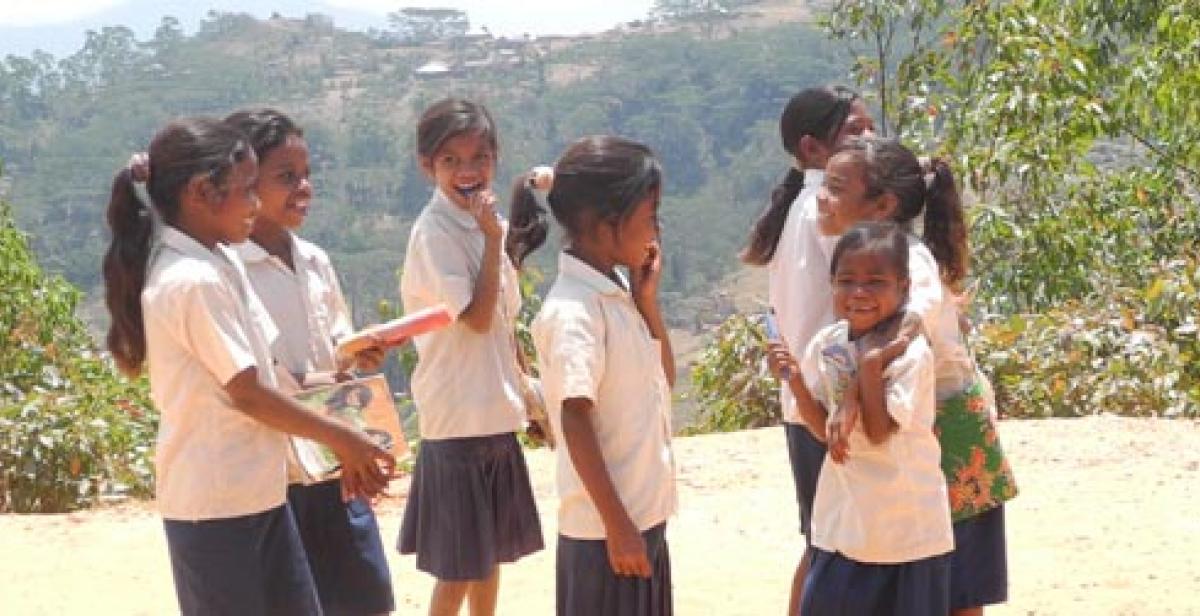With the initial advocacy gain on the postponement of the Ms. Timor Leste pageant, for the time- being, Progressio partner Rede Feto is taking up a more pressing issue: the high drop-out rate of young women and girls from schools. Rede Feto is leading the way in the advocacy for a comprehensive education policy that will facilitate the re-admission of young women and girls who have left school early.
A wise investment
The policy advocacy campaign is calling on the State to ensure that Timorese women and girls have equal access to and quality of education and, ultimately, to enable them to chart their own lives towards a brighter future.
The UN Secretary-General Ban Ki-Moon captured the importance of investing in women and girls’ education saying, “Educated mothers are more likely to have healthy children who survive. Educated families are less vulnerable to extreme poverty and hunger. And educated nations are more likely to enjoy vibrant economies, political stability and a respect for human rights.”
Barriers to education in Timor Leste
Young women and girls in Timor Leste face formidable barriers to education. The traditional practice of early marriage is primarily influenced by poverty – due to the promise of a ‘bride price’, a practice that still exists in the rural areas. Teenage pregnancy is considered the most important factor leading to high drop-out rate among school-age women and 72% of cases occur in rural areas.
The 2013 Committee on the Elimination of Discrimination Against Women (CEDAW) Report of the Government of Timor Leste re-affirmed the factors contributing to students leaving formal education early, especially among females, including a “lack of qualified and skilled school teachers; early marriage and unplanned pregnancy, and violence in schools.” Of the latter, the report mentions that girls still face sexual violence and insecurity in schools despite the ‘Zero Tolerance’ policy that was put in place to curtail malpractices in the education sector.
Law against domestic violence needs proper implementation
Young women and girls further face sexual abuse in the wider and highly patriarchal communities where they live and in their own homes where they are vulnerable to incest. Of the total 49 sexual violence cases in 2012-2013 managed by FOKUPERS, a member-organization of Rede Feto’s women’s netowrk, 27 were victims of incest. Of the 49 cases, 17 resulted in pregnancy and 39 of the young women affected were unable to continue their education. The age of these particular victims ranged from 7 to 18 years old.
This illustrates that the law against domestic violence that came into force in 2010, although being implemented to a certain extent, faces many constraints and has yet to be fully enforced.
Abused, pregnant and out of school
One such victim is Maria Atina (not her real name). She never imagined it could happen to her -- how her life could change in the most drastic and violent way. Two years ago, Maria Atina was a lively thirteen-year-old student at a public school in Timor Leste when her uncle sexually abused her several times. Constantly under threat by her abuser, it took her three months before she finally mustered the courage to tell her parents of her ordeal. She was immediately brought to the hospital for medical examination only to find out that she was three months pregnant. Her dream of some day working as a young professional in the capital city of Dili was dashed by the devastating news. She wondered how she could face her classmates and what her teachers would think of her. She knew she could not conceal her pregnancy for long. She had no choice but to leave school.
At fifteen Maria Atina is now a mother of a six month old baby. They are staying in one of the shelters for sexually abused women and girls managed by FOKUPERS. In some way she feels happy that she was able to seek justice: her abuser has been sentenced to twenty years in prison thanks to the Law Against Domestic Violence. She is slowly recuperating from her ordeal as she undergoes counseling sessions, but she cannot help but feel sad most times.
Maria Atina dreams of going back to school (preferably to a different one) although she fears of how she is going to cope and how she could keep her traumatic past a secret. She can only wish that the school environment will be favorable for a young mother like her. Maria Atina would like the government to hear her story, do something to help her and other victims of abuse and make it easier for them to go back to school.
Look out for the next installment from Progressio's Development Worker Vilma Horca who is supporting Rede Feto in creating their policy advocacy campaign
Photo: School girls in a rural area of Timor-Leste,© Lucy Jenkinson / Progressio



